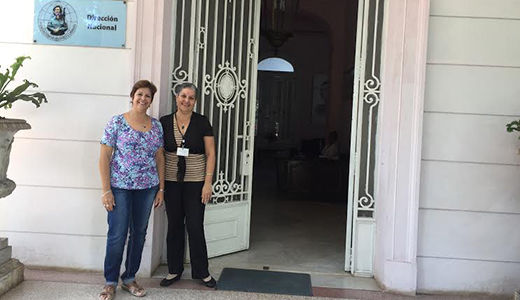
I remember walking into a grand and beautiful home, remnants of a time before the Revolution. It was sunny, and the home was full of windows. Everyone was at work, but still had enough time to look up and smile. We were shortly greeted and escorted to a meeting room. The visit to the Federacion de Mujeres Cubanas (Federation of Cuban Women) became one of the many surprises in my recent visit to Cuba.
In our meeting, we we’re entertained by Yanira V. Kuper Herrera, member of the National Secretary of International Affairs and Maritzel Gonzalez-Quevedo, Official of Foreign Relations. We were given in great detail, the history and accomplishments of the federation and Cuban women. After my experience with these leaders of Cuban women, I would like to share some of the historic accomplishments the federation is known for.
The FCW was founded on August 1960, at the beginning of the Revolution. Hence, this NGO organization has been active for 55 years. The early purpose was to become a beacon for women that were already organized for different reasons, but needed unity at the beginning of the Revolution. Vilma Espín was the chosen President for the FCW at the beginning of the revolution, and served that position for over 40 years. She was a revolutionary woman, who was ahead of her generation. Passionate about the task of bringing Cuban women together in the foundation of the mass organization. She dedicated her life to changing women’s roles, offering leadership and guidance, and innovation in a new era for women post revolution.
The FCW now functions as Cuba’s largest representation for women locally, nationally and internationally. According to EcuRed.org, the federation is described as a “mass organization that develops policies and programs aimed at achieving the full realization of equality of women in all areas and levels of society. The objectives of this organization is systematically provide input to the training and welfare of future generations.”
The FCW has 80,000 organizations, beginning at grassroots level. They created a magazine for women and one for young women, but are a source for all family members. These magazines attempt to educate women and their families and provide aid in day to day life. They also created State Nurseries, for universal child care, staffed with a registered nurse and a family physician. Within their newly incorporated independent work, the number of childcare providers is growing and a training is facilitated by the FCW, with the purpose of educating both the caregivers and parents. Another significant accomplishment for childcare is that all childcare facilities and providers now have removed sexist language and behavior. One way they have achieved this is by including games that switch gender roles.
This aids in educating young minds to respect and value each other for the being, not the sex. Creating a safe environment without gender judgement, helps young minds develop in a sexual unbiased way which promotes the growth of a productive member of society in the future. This method seemed so simple to me, yet so promising. We use sexist language on a regular bases, by using words such as “guys” when referring to a group of people, even when including women. We are so absent minded when we do this, which leaves you thinking it is ingrained in our system from a younger time. The FCW has come up with a way to help remove sexist language in future generations, by addressing the problem in early stages of human development.
Further accomplishments of women post revolution with aid from the FCW are as follows; Cuban women occupy 48 percent of the parliament, and out of 15 provinces in Cuba, women lead 10. More than 48 percent of women represent labor in the country and the Minister of Justice is currently a woman. They have founded 174 diverse counseling houses that educate men and women. They also occupy 70 percent of the health and education department in the country, and 70 percent of doctors are women, making them major leaders in the success of the revolution and emancipation of women’s oppression nationally and internationally. These incredible accomplishments cannot be ignored, and should be celebrated.
Abortion, the long-time taboo in U.S. and beyond, was something I felt curious about in the Cuban society. Cuban’s have universal health care for all health needs, without exceptions. Not even abortion is an exception. In fact, abortion is a universal right, and it is considered as only a women’s choice. Cuba does, however have a very intensive plan to educate women before making that decision; which includes visiting multiple doctors and specialists about the psychological and physical consequences of a potential abortion. However, since women have been educated about the responsibility of creating a family from early childhood, abortion is rare.
Actually, the number of children women chose to have has significantly gone down to one. Cubans say this is because women have decided to further their education, with more women reaching doctorate degrees and later starting a small family. On the other hand, Cuba is struggling with a birth rate that is dropping and an aging community. The federation and health department are now encouraging women to have more children. The health department’s role is strongly focused on the aging community. Some ways they are addressing this problem is by creating rehabilitation centers, prevention of amputations for people with diabetes, and healthy eating habits. In conclusion, Cubans are concerned that their population is not growing, and abortion is not a major problem.
The role of the FMC has not only given Cuban women the opportunity to grow, learn, feel identified and independent, but are also a leading example of gender equality in the world. So, Cuban women are not only represented in a large portion of government, work and higher education, but are also reaching gender equality in multiple areas nationally and internationally.
The social consciousness of Americans is becoming more progressive. Movements are fighting for basic rights, and are supporting each other in all ethnicities, genders, identities, and economic wealth. If we as Americans received universal health care, universal tuition of all levels, and lived in a country that supported our movements, we could also reach such accomplishments like Cuban women have. If a third world country that is considered poor and has lived through colonialism, slavery, dictatorships, war, a revolution, embargo and blockade, can provide all basic human needs, and exceed in individual and organized accomplishments, why can’t we hope to do the same in a country like the U.S.?
Before we walked down those grand stairs, we took some pictures together, hugged and bade each other farewell. Afterward, I was left with a feeling that was so familiar to me. Familiar to my childhood, when everything was pretty and promising. Before knowing the reality we live in, before understanding genocide, before living through years of action in defending human and animal rights. Before my understanding of Black Lives Matter movement and supporting our right to live. It was hope. Hope that we could also be liberated, and celebrated as individual human beings, not a tax number or a racial or sexist statistic. Hope for a United States of real democracy under a system that doesn’t attack its own people, but helps them grow and fulfill the “pursuit of happiness” for all.
Photo: Camila Valenzuela/PW


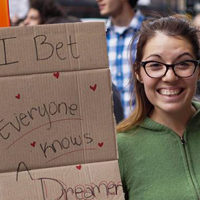
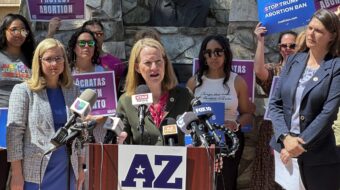
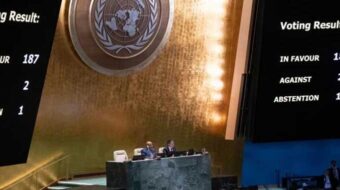
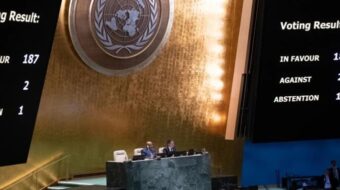






Comments